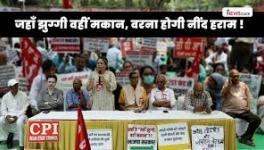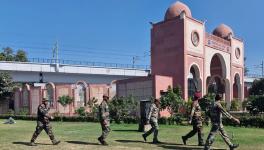The contentious demolitions are hit by the vices of administrative mala fides, irrationality, unreasonableness and arbitrariness, and are liable to be declared illegal for being in violation of Articles 14, 19 and 21 of the Constitution.
——-
The use of bulldozers in India has made news as the new State weapon to deter alleged culprits of riots in the pursuit of delivering instant justice. Although the state of Uttar Pradesh adopted the practice back in 2019 after the anti-Citizenship Amendment Act riots and has been continuing the same unapologetically, the states of Madhya Pradesh and Gujarat, and the National Capital Delhi followed suit after the riots broke out during Ram Navami and Hanuman Jayanti earlier this year. The Supreme Court was seized of these demolitions in two different Public Interest Litigations (‘PILs’) and had ordered a status quo.
Fairness is the basic principle of good administration, and there is a duty to act fairly in all administrative actions, which means to act justly and fairly, and not arbitrarily or capriciously.
While the fate of these inhabitants is yet to be decided by the Supreme Court, Uttar Pradesh witnessed a fresh round of such demolitions in the aftermath of protests in the Prayagraj area in the first week of this month, when the houses of alleged protestors were razed down by the state government, claiming the houses to be “illegal structures”. A separate PIL has been filed in the Supreme Court against the Prayagraj demolitions as well.
Here, we analyse the propriety of these demolitions in the light of statutory provisions and principles of administrative law, and argue that the demolition drives are hit by the vice of administrative mala fides, being a colourable exercise of administrative power.
The demolition of any structure, whether permanent or temporary, leads to deprivation of the livelihood and shelter of an individual and their dependents, which are the essential attributes of the right to life under Article 21 of the Constitution, as has been held by the Supreme Court in its landmark judgment in the case of Olga Tellis versus Bombay Municipal Corpn. (1985).
Article 21 states that no person shall be deprived of life and personal liberty except according to procedure established by law. It is well settled since the landmark judgement of the Supreme Court in Maneka Gandhi versus Union of India (1978), that such procedure has to be just, fair and reasonable.
In State of Punjab versus Salil Sabhlok (2013), the Supreme Court held that in the exercise of all constitutional or statutory powers, there is an implied requirement that every exercise of power/direction must be fair, reasonable and just, and must also be guided by public interest. Fairness is the basic principle of good administration, and there is a duty to act fairly in all administrative actions, which means to act justly and fairly, and not arbitrarily or capriciously.
It is not only enough to issue a notice, but it must also be adequate, that is, sufficient time should be given to comply with the requirement of notice.
Lack of notice
The major issue with these demolitions is regarding the issuance of notices to the occupants/inhabitants before demolition of their structures, as required under the respective state laws and emphasized by the Supreme Court in a catena of judgments (such as State of J&K versus Haji Wali Mohammed (1972), Collector of Customs, Mumbai versus Virgo Steels, Bombay & Anr. (2002), Canara Bank versus Debasis Das (2003), and Mun. Corp., Ludhiana versus Inderjit Singh & Anr. (2008)), as an essential requirement in recognition of principles of natural justice.
In the case of the Jahangirpuri demolition, the petitioners before the Supreme Court claimed lack of proper notice, whereas the municipal authority contended the opposite. In the latest demolitions in Prayagraj, notices were issued not even 24 hours before the structures were brought down. It is pertinent to note that it is not only enough to issue a notice, but it must also be adequate, that is, sufficient time should be given to comply with the requirement of notice. In Haji Wali Mohammed, when only 24 hours’ notice was served before demolishing a structure allegedly in a dilapidated condition, the Supreme Court struck it down, holding that the notice was not proper.
Also read: Illegal demolitions in the light of domestic and international law
Selective targeting
Arguendo, even if the notices as required by law were served upon the occupants, as is the stand taken by the state governments, it is clear from the statements of the Ministers (including Chief Ministers) and politicians from the ruling parties in these states, made immediately after the demolitions, that the actual motive of the demolition drives was to punish those allegedly involved in the riots. Moreover, the sequence of events, that is, the close proximity between the riots/communal clashes and the demolitions in all the four states and union territory selectively at the sites where the alleged rioters reside, ruled by the same political party, make it palpably clear that the actual purpose of the drives was a crackdown on the alleged rioters and not the removal of illegal structures.
Passing an order for an unauthorised purpose constitutes malice in law.
Additionally, as argued by the senior counsels representing the petitioners before the Supreme Court, there are around 1,700 unauthorized colonies in Delhi, of which the demolition was only carried out at the spot where the riots took place. In these circumstances, the demolition exercise can aptly be described as a colourable exercise of administrative power. Prof. I.P. Massey in his book ‘Administrative Law’ (Ninth edition, pg. 389-390) explains:
“[A]dministrative power cannot be used for the purpose it was not given. Therefore, achieving an unauthorised purpose will be a colourable exercise of power subject to judicial review … No public authority can act in bad faith or with corrupt motives. If any administrative authority has acted in a mala fide manner, it will be subject to the review jurisdiction of the court. In case of mixed considerations, courts try to find out the dominant purpose which impelled administrative action. Power is exercised maliciously when an action is motivated by personal animosity towards one who is affected by it. It is considered as fraud on power.”
Passing an order for an unauthorised purpose constitutes malice in law (as per the Supreme Court in Punjab State Electricity Board Ltd. versus Zora Singh (2005)). The demolitions bear a close semblance to the recent case of Kangana Ranaut versus Mun. Corp. of Greater Mumbai & Ors (2020), wherein the Brihanmumbai Municipal Corporation demolished the office space of the petitioner by serving a hasty notice, actuated by a Twitter spat between the petitioner and a prominent political leader from the ruling party of the state. The Bombay High Court quashed the demolition notice issued by the respondents as being motivated by mala fides and malice in law, causing substantial injury to the petitioner, and appointed a valuer to prepare an estimate to award compensation to the petitioner against the illegal demolition carried out by the municipal corporation. While doing so, the court held:
“Irresponsible statements made by a citizen in an individual capacity, however distasteful or wrong they may be, are best ignored. Illegal and colourable action/s on part of the State or its agencies vis-a-vis a citizen, is far too serious and damaging to society to be overlooked. Whatever be the folly of an individual, whether in the matter of unauthorized construction, or irresponsible statements hurting the sentiments of individuals or the public in general, no action against such individual by anyone, much less by the State, can lie except within the four corners of law. By no means, colourable exercise of power or resort to threats, use of muscle power and/or causing of injury by unlawful means to such person or to his/her property, can be permitted in any civil society. Such actions are the very antithesis of the rule of law.”
Also read: Laws, flaws and accountability
Arbitrary action
It is also a well-established principle of administrative law that if in an administrative action, all relevant factors are not considered, or irrelevant considerations are allowed to find consideration, the decision is vitiated by arbitrary judgment. The principle was explained by the Supreme Court in J.R. Raghupathy versus State of A.P. (1988) , in the following words:
“That authority must generally address itself to the matter before it: it must not act under the dictation of other body or disable itself from exercising a discretion in each case. In the purported exercise of its discretion, it must not do what it has been forbidden to do, nor must it do what it has not been authorized to do. It must act in good faith, must have regard to all relevant considerations and must not be swayed by irrelevant considerations, must not seek to promote purposes alien to the letter or to the spirit of the legislation that gives it power to act, and must not act arbitrarily or capriciously.” [emphasis supplied by the authors]
Thus, it will not be out of place, after considering the principles propounded in these judgments and the sequence of events in which demolitions were conducted, to conclude that the state governments were influenced by ill motives and extraneous considerations while carrying out the claimed anti-encroachment drives.
If in an administrative action, all relevant factors are not considered, or irrelevant considerations are allowed to find place, the decision is vitiated by arbitrary judgement.
It is also to be noted that the government of Uttar Pradesh is equipped with the Recovery of Damages to Public and Private Property Act, 2020, which provides for recovery from the rioters of the damage caused during the riots to public and private properties in the form of fine and compensation, respectively. Even under this law, there is no provision for summary demolition of the properties of the accused, and even the recovery proceedings can take place only after the guilt of the rioters is fixed by a court of law. Despite there being such a law in place, the state government has assumed unto itself the task of judge, jury, and executioner to carry out the illegal demolitions in utter disregard for the basic tenets of constitutional democracy.
Also read: Loss beyond repair: how victims cope with the aftermath of the illegal anti-encroachment drive
The contentious demolitions were carried out to promote a hidden agenda of the State, under the shadow of removing illegal structures. Such action is hit by the vices of administrative mala fides, irrationality, unreasonableness, and arbitrariness, and is thus liable to be declared illegal for being in violation of Articles 14, 19 and 21 of the Constitution.

























